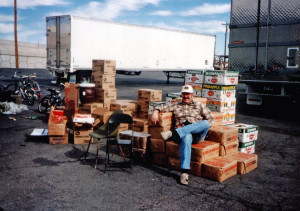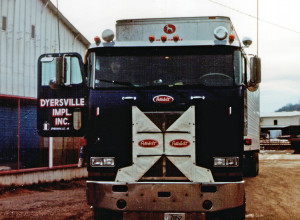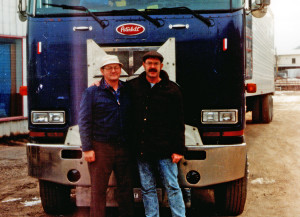 I recently stopped by to see my old friend Louie Kartman, a retired trucker who’d driven every state and hauled everything from baling twine to churches during his nearly 50-year driving career. Now beyond 85 years old, he never fails to reminisce about the one trip I took with him back in 1990. For Louie, the trip from Dubuque, Iowa to El Paso, Texas, on a humanitarian run delivering food, clothing and household items destined for a mission in Juarez, Mexico, was his shining moment to share his world with me. At the time, I was a high school English teacher on sabbatical, so I had some time to tag along. Clearly, it was an important time – a time that gave both of us a story to remember and re-tell over 25 years later. So, here goes…
I recently stopped by to see my old friend Louie Kartman, a retired trucker who’d driven every state and hauled everything from baling twine to churches during his nearly 50-year driving career. Now beyond 85 years old, he never fails to reminisce about the one trip I took with him back in 1990. For Louie, the trip from Dubuque, Iowa to El Paso, Texas, on a humanitarian run delivering food, clothing and household items destined for a mission in Juarez, Mexico, was his shining moment to share his world with me. At the time, I was a high school English teacher on sabbatical, so I had some time to tag along. Clearly, it was an important time – a time that gave both of us a story to remember and re-tell over 25 years later. So, here goes…
“Hey, Ken, how’s about riding with me to El Paso next week?” This simple question started the ball rolling and began an experience with Louie which gave me a different outlook on the world of over-the-road truckers. For years I’d wanted to go with Louie to see what this business of trucking was all about, and now I had my chance: from Iowa to Texas and back, in ten days, covering over 3,000 miles. As I climbed up into Louie’s cabover and settled into the seat, I had no idea what lay ahead.
As a favor to the community, and at his own expense, Louie agreed to haul a load of food and clothing to a mission in Mexico near El Paso, Texas. While I watched the truck being loaded, I sensed the real togetherness of area truckers. Several gave up their time to help load, while still others poured over maps and routings with Louie. I felt a closeness to these drivers who, without seeking any money, without questioning why, without wondering what to do, showed up to help us get on the road.
 We pulled out and only drove a few miles when Louie stopped to make a phone call – apparently, something was missing from the bulging document pouch he carried. Suddenly, I was introduced to the bureaucracy of the trucking world. There were papers for everything, but something about “permits and bingo stamps” had Louie all worked up with whoever was on the other end of the phone. Within half an hour, the owner of the rig appeared and reassured Louie everything was in order. As he crawled back into the cab, I heard him grumble, “There’s still no Bill of Lading, and I don’t see no fuel permits for Missouri or Kansas… look in that pouch again.”
We pulled out and only drove a few miles when Louie stopped to make a phone call – apparently, something was missing from the bulging document pouch he carried. Suddenly, I was introduced to the bureaucracy of the trucking world. There were papers for everything, but something about “permits and bingo stamps” had Louie all worked up with whoever was on the other end of the phone. Within half an hour, the owner of the rig appeared and reassured Louie everything was in order. As he crawled back into the cab, I heard him grumble, “There’s still no Bill of Lading, and I don’t see no fuel permits for Missouri or Kansas… look in that pouch again.”
I started reading off the papers and soon realized how much truckers dealt with on the road. We had no current fuel permits, so Louie said we’d need to get past the chicken coops – “the weigh stations,” he added, after he saw my puzzled expression – before they opened or after they closed. A few hours later, we pulled into a rest stop near the Missouri border and Louie got on the horn to check the traffic from the south. The chicken coop was closed, and as I listened to the chatter on the CB, I was again impressed by the faceless and nameless drivers. They were all like a huge family, traveling the dark roads together, each ready to help the other.
We eased back onto the interstate and rolled across the state line, confident we missed the first scale. “Boy, I’m real glad that coop was shut down,” Louie sighed as we drove by, “because I think we’re overweight, to boot. I moved the wheels, but I just don’t know. I’d hate to get fined for being too heavy, what with all this being free stuff for the poor.” Now I knew what Louie had done earlier that day, when a trucker pulled a pin and I saw the wheels slide back. More and more, I was discovering the necessary tricks of survival for truckers.
As we continued on the interstate with no serious problems, I began to enjoy the ride and chatter between us. In fact, I received a first-class education on the world of trucking as I listened to Louie’s endless well of stories from 30 years of over-the-road travel. Each time we stopped, I found Louie catching up on odds and ends in his logbook, along with plotting out fuel stops and chicken coops. Louie was a master at juggling all the loose ends, and I admired all the other drivers I saw doing much the same at the various rest stops. On one stop, somewhere in the south of Kansas, I really came to terms with the entire world of truck drivers.
 The truck stop was large and the hour was late, but the whole place was a beehive of activity. Way in the back were the sleepers, while others were lined-up at the fuel pumps, and still others were parked close to the restaurant. Once we were refueled, we went inside to eat. Truckers drive hard and boy do they eat well! I ate the biggest 26-ounce steak I ever saw – so big it literally hung over the plate. I figured such steaks were only served in movies, but nearly every trucker was chowing down on an equally-large chunk of meat and all the trimmings. I don’t know of any place I’ve ever been where I had as much fun eating, for in-between mouthfuls of delicious food, many were laughing and joking with each other. I felt warm and peaceful among this jovial group.
The truck stop was large and the hour was late, but the whole place was a beehive of activity. Way in the back were the sleepers, while others were lined-up at the fuel pumps, and still others were parked close to the restaurant. Once we were refueled, we went inside to eat. Truckers drive hard and boy do they eat well! I ate the biggest 26-ounce steak I ever saw – so big it literally hung over the plate. I figured such steaks were only served in movies, but nearly every trucker was chowing down on an equally-large chunk of meat and all the trimmings. I don’t know of any place I’ve ever been where I had as much fun eating, for in-between mouthfuls of delicious food, many were laughing and joking with each other. I felt warm and peaceful among this jovial group.
Finally finished, Louie turned to a (pay) phone and called home. I took the time to roam about the truck stop and once again found my stereotyped image of truck drivers dissolving. Several were chatting around a book rack filled with westerns, murder mysteries and other novels, and I was impressed by their impromptu “book club” being held as they listened to one another talk about their favorite. Of course, people assume truck drivers don’t read because they prefer to drink and fight. But, in my brief encounter, I found these seemingly rough and tough drivers were as sensitive and literate as any non-truckers sharing the roads. In fact, I’d wager truckers read more since they are so often at the mercy of freight receivers as to when they can unload. Judging by the “books on tape” rack, I’m sure many others were roaring down the road with novels coming over the speakers of their cassette players.
Refueled and fed, we left Kansas, and our situation became pretty hairy as we snaked our way down into Texas. Eventually, we hit an open chicken coop and here I learned the real art of truck driver diplomacy. Turns out we weren’t overweight like Louie thought, but the lack of documentation for the load caused Louie some problems – as did the lack of bingo stamps. Again, my respect for drivers deepened as I realized the restrictions and requirements each state imposed upon truckers’ rights to travel and haul goods. I’m sure there’s some sense to it all, but as I watched Louie go through the mound of papers in his document pouch, in an effort to convince the officer his intentions were good, all I saw was frustration on Louie’s face. We got out of the coop with no fine when the officer finally cited our efforts as a “humanitarian act.” But it didn’t matter to us – we were finally able to get rolling for the last part of the trip down.
Since we were not allowed to drive into Juarez, Mexico, to the mission, the Mexican government required us to unload everything at the border in El Paso. After they inspected it all, they loaded it into their own trucks to make the delivery. We know the stuff made it there because the next day – and several thereafter – we went to the mission to help with some construction, and we were there when the goods arrived.
Once the load was delivered safely and our construction work was done, we enjoyed a hot shower and a good night’s sleep in a motel bed before heading back north. Louie snagged a load in El Paso to take up to Oklahoma City and then, amazingly, found a load to pick up in Oklahoma City headed right into Iowa. For Louie, the loads saved the trip because he was able to recover his costs for the “free” freight heading south.
Looking back, I’m really glad I got to tag along with my friend Louie on that trip and saw firsthand all that goes on in the trucking world. Now, whenever I see a big eighteen-wheeler rolling down the highway, I just smile, knowing first-hand that truckers are a neat bunch of folks out there.
